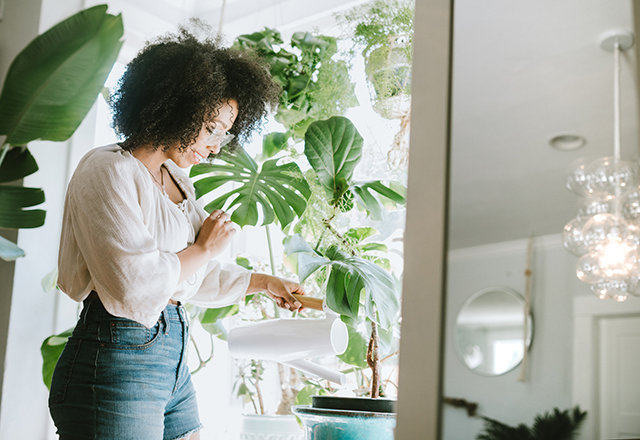With people spending more time at home than ever before, the appeal of bringing nature indoors has been catching on — and the benefits are more than just aesthetic. Research suggests that including plants in our daily surroundings can also have a positive impact on our physical and emotional well-being.
Plants improve air quality
According to the American Lung Association, being cooped up inside can increase our exposure to airborne pollutants, which are often at much higher concentrations than outdoors. Some of the most common air pollutants found in our homes and workplaces include asbestos, mold, radon, formaldehyde, benzene and carbon monoxide. Not only do plants increase the amount of oxygen in our homes, but their root systems are especially good at reducing indoor air pollution. Research by NASA has shown that houseplants can eliminate 87% of harmful toxins within only 24 hours!
Plants can also help you sleep better at night. Plants release oxygen during the day through the process of photosynthesis, while at night, the plants absorb oxygen and release carbon dioxide via respiration. However, some plants can also absorb carbon dioxide during the night. These plants improve air quality throughout the night, allowing you to sleep more soundly and wake up feeling refreshed.
Plants improve well-being
Although humans are deeply connected to nature, over 85% of a person’s daily life is spent indoors. A large portion of this time is spent in front of a screen, which drains our limited capacity for “directed attention.” Adding houseplants to our surroundings gives our brains a break in the scenery by providing an opportunity for “undirected attention,” which is passive and effortless. Research has shown that this respite regenerates our directed attention, boosting our ability to concentrate and be productive. These findings are supported by other studies on Attention Restoration Theory, which asserts that the restorative power of nature can improve our focus and prevent mental fatigue.
Plants can also improve mental health at home and in the workplace. A study from Japan found that people who kept a small plant on their desk had reduced anxiety and stress. Another study of offices in the U.K. and the Netherlands found that having plants in the office increases the quality of life and productivity of employees. The source of happiness may go beyond looking at the foliage itself. Researchers have identified a microbe in soil that acts as a natural antidepressant, Mycobacterium vaccae (nicknamed an “outdoorphin”). This microbe can enhance the release of anti-inflammatory molecules that fight stress and can increase the amount of serotonin in the prefrontal cortex, which is important for mood regulation. In mice, treatment with Mycobacterium vaccae can prevent stress-induced conditions including digestive distress, anxiety and fear.
So, whether you want to improve productivity, concentration, creativity or memory, houseplants are a valuable addition to your home and workspace. These benefits aren’t just for adults either. Including plants in a child’s learning environment can also enhance their learning capabilities by improving their ability to focus and retain information.
Okay, I’m convinced. So how many plants do I need?
A team of scientists from RMIT University and the University of Melbourne analyzed over 100 scientific manuscripts to evaluate the existing evidence for a relationship between plants, health and well-being. The researchers found two main benefits of plants in indoor environments: air quality and well-being. Based on the best available scientific evidence, the research team created a simple formula for people to get the most out of their plants.
For a small room, the researchers found that a single medium plant can improve air quality by 25% with a modest benefit to well-being. The study determined that at least five medium plants were necessary for significantly improved health and well-being. They also noted that complexity matters, so you should vary the size and species of your plants to get the most out of both benefits.
If you are feeling uninspired by your work-from-home environment, adding a few plants could be just what you need to come up with your next great idea. Stop by these amazing Baltimore businesses to get started!
- B. Willow - An urban jungle located just steps away from the Johns Hopkins Homewood campus. B. Willow offers a wide variety of indoor plants as well as handcrafted goods by local artisans. If you want to learn more about plant care and are wondering where to start, B. Willow also hosts workshops so you can develop that green thumb of yours!
- Plantacea - Nestled in Federal Hill, Plantacea’s slogan is “at the intersection of plants and happiness.” With a plant selection ranging from tropical to carnivorous, it is easy to see why. Plantacea also has a propagation wall that allows you to take a cutting if you leave a cutting, so you can expand your collection at no cost! As a welcome bonus to new plant parents, if you need advice, they welcome emails, texts and photos to help solve any plant problems.
Related content
- Walking Through This Pandemic
- Meditation: Building a Community Across the Hopkins Campus
- Working from Home: Tips for the Long Haul
Want to read more from the Johns Hopkins School of Medicine? Subscribe to the Biomedical Odyssey blog and receive new posts directly in your inbox.
